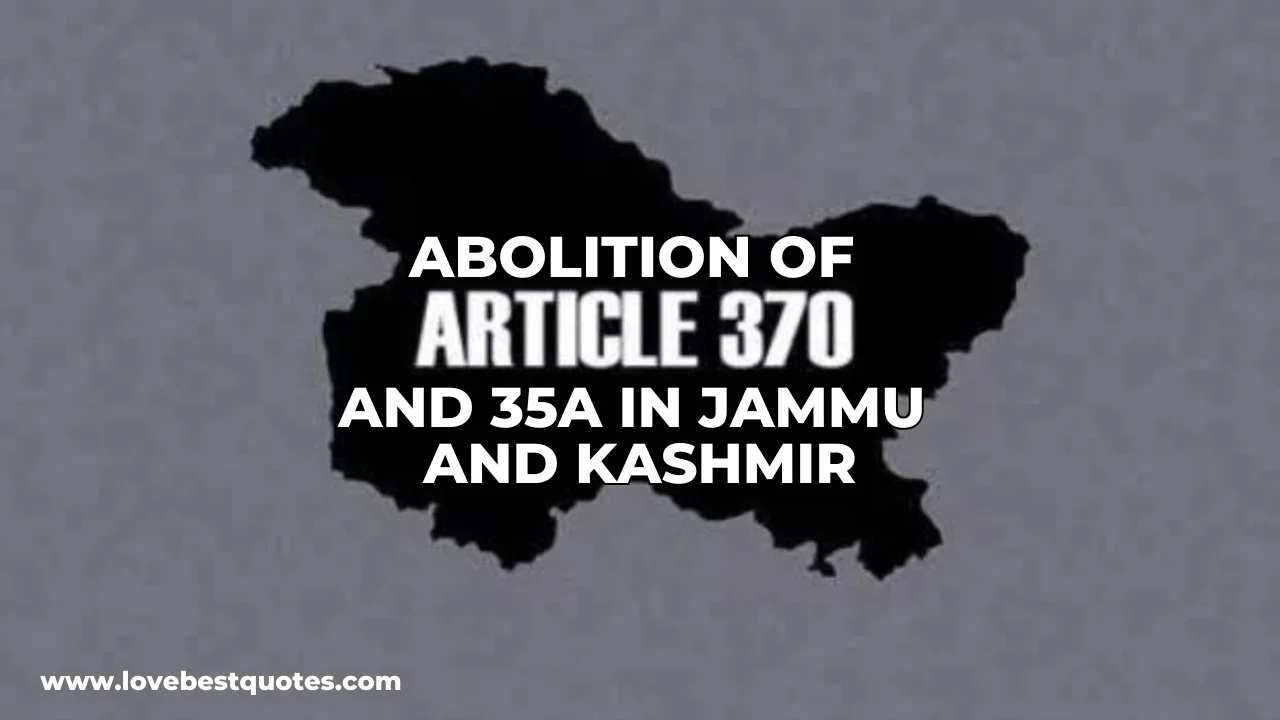In August 2019, a historic decision was taken across India when the government took the bold step to Abolition of Article 370 and 35A in the state of Jammu and Kashmir. This monumental step, aimed at integrating the region more closely with the rest of the country, sparked both jubilation and debate across the country. In this article, we look at the intricacies of Article 370 and Article 35A, their repeal, and the implications for the region.
Understanding Articles 370 and 35A
Before we look at the implications of their repeal, we must first be clear about what Articles 370 and 35A mean.
Article 370: The Special Status
Article 370 of the Constitution of India granted special autonomy to the state of Jammu and Kashmir. It allowed the state to have its own constitution, flag, and a high degree of independence in all matters except foreign relations, defense and communications. This unique provision was supposed to be temporary but remained in force for decades.
Article 35A: The Controversial Amendment
Article 35A, an offshoot of Article 370, empowered the Jammu and Kashmir state legislature to define “permanent residents” and grant them exclusive rights and privileges. These rights included ownership of property, access to government offices and other social benefits. However, this also led to debates and disputes over the years.
The decision for Abolition of Article 370
In August 2019, the Indian government, led by Prime Minister Narendra Modi and Home Minister Amit Shah, took a decisive step to repeal Articles 370 and 35A. This move was aimed at fully integrating Jammu and Kashmir into India, abolishing its special status, and bringing it under the same legal framework as the rest of the nation.
Public reaction
The decision to abolition of Article 370 was received with mixed reactions. While some hailed it as a historic and long overdue step, others expressed concern over the possible consequences and loss of autonomy for the region. The immediate news blackout and security measures imposed after the announcement also raised concerns.
Impact on Jammu and Kashmir
Sociopolitical changes
The repeal of Articles 370 and 35A brought about some significant changes in Jammu and Kashmir. The region was restructured into two Union Territories, Jammu and Kashmir and Ladakh, under the direct control of the central government. The aim of this was to boost economic development, improve governance, and enhance security in the region.
Economic opportunities
With the abolition of these articles, the doors to Jammu and Kashmir were opened to investment from all over the country. Businesses and industries saw new opportunities to set up shop in the region, which could lead to economic growth and job creation.
Security measures
The government’s decision also allowed for a more comprehensive approach to security in the region. By integrating Jammu and Kashmir more closely with the rest of India, it hoped to combat terrorism and insurgency more effectively.
Challenges and debates
The repeal of Articles 370 and 35A sparked legal challenges in the Supreme Court of India. Some argued that the move was unconstitutional, while others defended it as a necessary step for the development and integration of the region. The decision continues to be the subject of intense debate, both nationally and internationally. While supporters see it as a way to bring prosperity and peace to the region, critics express concerns about the loss of cultural identity and autonomy of the people of Jammu and Kashmir.
Supreme Court of India Judgement of 11 December 2023
On December 11, 2023, the Supreme Court of India issued a landmark ruling concerning the abrogation of Articles 370 and 35A. In its historic judgment, the Court affirmed the sovereignty and integrity of India, a sentiment deeply cherished by every Indian. The ruling emphasized that the action taken on August 5, 2019, to revoke Article 370, thereby ending the special status of the former state of Jammu and Kashmir, was aimed at strengthening constitutional integration rather than promoting disintegration. Additionally, the Court acknowledged that Article 370 was not intended to be a permanent provision in the first place.
Impact of Article 370 Abrogation: Transformative Changes in Jammu and Kashmir
The abrogation of Article 370 has set in motion a transformative journey for Jammu and Kashmir, ushering in an era of peace, economic prosperity, enhanced infrastructure, and a thriving tourism industry. As the region embraces these positive changes, it stands poised for a future defined by progress and inclusivity.
A New Era of Peace
Since the abrogation of Article 370, Jammu and Kashmir have witnessed a remarkable decline in violence. Official data reveals a staggering 50% reduction in terrorist incidents, with security forces successfully neutralizing over 300 militants in the past four years. This positive shift can be attributed to a strategic amalgamation of heightened security measures, improved intelligence gathering, and a waning public endorsement for militancy.
Economic Renaissance Unleashed
The government’s proactive measures to spur economic development in Jammu and Kashmir have borne fruit. Initiatives like the Prime Minister’s Development Package (PMDP) and the Industrial Development Scheme (IDS) have ignited a surge in investment, job creation, and overall economic growth. Notably, the region experienced a remarkable 31% growth in tax revenue. In the financial year 2022-23, J&K’s Gross State Domestic Product (GSDP) soared by 8%, outpacing the national average of 7%.
Building Foundations
Significant investments in infrastructure have reshaped Jammu and Kashmir’s landscape. Major projects encompassing the construction of roads, bridges, tunnels, and power lines have not only enhanced connectivity but have also facilitated smoother travel and business operations within the region. The foundations for sustainable growth have been laid.
Tourism Flourishes
The abrogation of Article 370 has sparked a tourism renaissance in Jammu and Kashmir. A confluence of factors, including heightened security, strategic marketing, and innovative tourism initiatives, has led to a substantial surge in tourist arrivals. Recent reports indicate that in 2022 alone, Jammu and Kashmir hosted a record-breaking 1.62 crore tourists, marking the highest number in India’s 75 years of independence.
Empowering Lives Through Education
In addition to the visible transformations, there has been a concerted effort to uplift education in Jammu and Kashmir. The government’s focus on education reform has resulted in increased accessibility to quality schooling. Initiatives such as the establishment of new schools, the introduction of modern teaching methods, and scholarship programs have contributed to a more robust educational framework.
Digital Revolution Unleashed
The digital wave has not bypassed Jammu and Kashmir. Post the abrogation, there has been a significant push towards digital inclusion. The region has witnessed the proliferation of digital infrastructure, fostering greater connectivity and access to online resources. This technological leap has not only bridged geographical gaps but has also opened avenues for digital literacy and e-commerce.
Local Empowerment and Governance
A notable aspect of the post-370 era is the emphasis on local governance and empowerment. The implementation of the District Development Council (DDC) elections marked a pivotal step towards decentralization. Local leaders now play a more active role in decision-making processes, ensuring that developmental policies align with the unique needs and aspirations of the region’s diverse communities.
Cultural Renaissance and Global Recognition
Jammu and Kashmir’s rich cultural heritage has gained renewed focus, leading to a cultural renaissance. The region’s art, music, and traditional crafts have garnered global attention, with various cultural events and festivals showcasing the vibrancy of its cultural tapestry. This renewed cultural spotlight has not only instilled a sense of pride among the locals but has also attracted global recognition and appreciation.
Challenges and Aspirations
While the post-370 period has witnessed significant positive changes, challenges persist. Issues such as the resettlement of displaced Hindu Kashmiri Pandit community, ensuring inclusive development, and maintaining sustained peace remain focal points. The aspirations of the people include not only economic prosperity and infrastructural development but also fostering a sense of unity and harmony among the diverse communities that call Jammu and Kashmir home.
Recommended Reading: Achievement of Shri Narendra Modi
As Jammu and Kashmir continues its journey post the abrogation of Article 370, the narrative is one of resilience, progress, and a collective vision for a brighter future. The amalgamation of developmental initiatives, cultural resurgence, and local empowerment paints a picture of a region poised for a holistic transformation. The road ahead holds the promise of overcoming challenges and building a sustainable, inclusive, and harmonious society.
Conclusion: A New Chapter Unfolding in Jammu and Kashmir
The abrogation of Article 370 has undeniably turned the page on Jammu and Kashmir’s narrative. Once a region painted in stark shades of conflict and uncertainty, the canvas now vibrates with the promise of transformation. The decline in violence is a brushstroke of hope, etched alongside the bold strokes of economic progress and infrastructure development. A flourishing tourism sector adds splashes of color, showcasing a land increasingly open to the world. This post-370 landscape is not merely a snapshot of change, but a testament to resilience and a brushstroke towards a future where unity, inclusivity, and shared prosperity form the guiding palette. The echoes of Jammu and Kashmir’s rich cultural heritage still resonate, but now they mingle with the symphony of modern development, composing a compelling song of transformation.
Recommended Reading : Narendra Modi a Global Leader Shaping the Future
Education, digital empowerment, and local governance – these are not mere tools, but threads woven into the fabric of sustainable development. As Jammu and Kashmir embraces its cultural tapestry and steps onto the global stage, the narrative shifts. It’s a story of unity, progress, and a shared vision for a harmonious future. Yet, the canvas remains unfinished. Challenges, like the resettlement of displaced populations and the need for inclusive development, require careful attention. The road ahead demands a steady hand and a commitment to sustained peace. For the people of Jammu and Kashmir, the dream extends beyond economic prosperity. They yearn for a society that is an intricate tapestry – resilient, inclusive, and vibrant, where every thread shines, weaving a future as rich and diverse as the land itself.
FAQ
Most frequent questions and answers
Articles 370 and 35A were abolished to fully integrate Jammu and Kashmir into India and bring it within the same legal framework as the rest of the country.
The immediate consequences included the restructuring of Jammu and Kashmir into two Union Territories viz Jammu & Kashmir and Ladakh and the imposition of security measures.
The public reaction was mostly positive, with only some political parties and others expressing concern about the impact.
Yes, the constitutionality of the decision was challenged in the Supreme Court of India. However, the Supreme Court of India in its judgment of 11 Dec 2023 stated that the action taken to revoke Article 370, was aimed at strengthening constitutional integration rather than promoting disintegration and thus in order.
The long-term impact of the removal of Article 370 and 35A from Jammu & Kashmir is a bold and positive step of the Modi Government. It is hoped that the region will see economic growth, improved governance, and enhanced security. The results have been very positive and encouraging.
Recent Posts
- The Maverick of Tinseltown: Clint Eastwood’s Everlasting Influence in Hollywood
- The Man Behind the Mask: A Psychological Portrait of Vladimir Putin
- Bible Verses: The Ultimate Life Hacks
- Laura Berlin Biography: A Saga of Talent and Resilience
- Abolition of Article 370 and 35A in Jammu and Kashmir: A transformational journey










